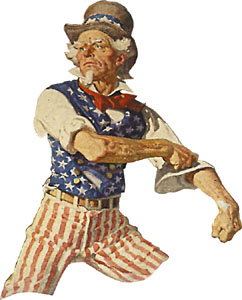The British Empires' Rebellious Colonies
 Earlier this week I wrote about the rebirth of the British Empire in Jonathan Stroud’s Bartimaeus series and Philip Reeve’s Larklight (which will officially become a series in October). I harped on how both authors seem to shy away from awkward elements of the real UK’s imperial history: oppression of peoples in south Asia and Africa, border-drawing in the Mideast, trade wars in China, etc.
Earlier this week I wrote about the rebirth of the British Empire in Jonathan Stroud’s Bartimaeus series and Philip Reeve’s Larklight (which will officially become a series in October). I harped on how both authors seem to shy away from awkward elements of the real UK’s imperial history: oppression of peoples in south Asia and Africa, border-drawing in the Mideast, trade wars in China, etc.
But there’s one region of the old British Empire that Stroud and Reeve have no problem depicting under the control of their fantastic Londons. And what part would that be? America!
The mere mention of American colonies signals that each book occurs in a fantasy world, of course. Nevertheless, America remains a source of rebellion and trouble for Britain. In the Cybils-winning Ptolemy’s Gate, a North American war for independence is draining the resources of the magicians’ regime in London, just as the nascent USA’s revolution did for Lord George Germain’s government around 1780. It’s unclear at the end of the book whether a more democratic government in London would maintain that struggle, give it up, or reach some accommodation with the rebels.
In Larklight, young narrator Art Mumby writes of American colonies in the first pages, indicating that they’re still firmly part of Britain's Empire in this 1851. But later, when discussing who’s tried to steal away Sir Isaac Newton’s alchemical secrets, Art lists “Frenchmen and Russians and rebel Americans.” The first two were Britain’s rivals for influence in the early 1800s (before the emergence of a united Germany), but the last reflects a perception of the American character that extends even into this fantasy world.
I can’t help but see a bit of national wish-fulfillment in how these books show Britain still ruling America, especially in a decade when many people on both sides of the Atlantic have perceived the opposite. The American market has been very lucrative for British fantasy authors, but there’s bound to be a little ambivalence, isn’t there?


No comments:
Post a Comment